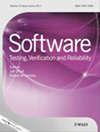Quality assurance for Internet of Things and speech recognition systems
IF 1.2
4区 计算机科学
Q3 COMPUTER SCIENCE, SOFTWARE ENGINEERING
引用次数: 0
Abstract
In this issue, we are pleased to present two papers: one for risk assessment for an industrial Internet of Things and the other for testing speech recognition systems. The first paper, ‘ HiRAM: A Hierarchical Risk Assessment Model and Its Implementation for an Industrial Internet of Things in the Cloud ’ by Wen-Lin Sun, Ying-Han Tang and Yu-Lun Huang, proposes Hierarchical Risk Assessment Model (HiRAM) for an IIoT cloud platform to enable self-evaluate its security status by leveraging analytic hierarchy processes (AHPs). The authors also realise HiRAM-RAS, a modular and responsive Risk Assessment System based on HiRAM, and evaluate it in a real-world IIoT cloud platform. The evaluation results show the changes in integrity and availability scores evaluated by HiRAM. (Recommended by Xiaoyin Wang). The second paper, ‘ Adversarial Example-based Test Case Generation for Black-box Speech Recognition Systems ’ by Hanbo Cai, Pengcheng Zhang, Hai Dong, Lars Grunske, Shunhui Ji and Tianhao Yuan, proposes methods for generating targeted adversarial examples for speech recognition systems, based on the firefly algorithm. These methods generate the targeted adversarial samples by continuously adding interference noise to the original speech samples. The evaluation results show that the proposed methods achieve satisfactory results on three speech datasets (Google Command, Common Voice and LibriSpeech), and compared with existing methods, these methods can effectively improve the success rate of the targeted adversarial example generation. (Recommended by Yves Le Traon). We hope that these papers will inspire further research in these directions of quality assurance.物联网和语音识别系统的质量保证
在本期中,我们很高兴地介绍两篇论文:一篇用于工业物联网的风险评估,另一篇用于测试语音识别系统。第一篇论文《HiRAM:工业物联网云中的分层风险评估模型及其实现》由孙文林、唐英涵和黄玉伦撰写,提出了工业物联网云平台的分层风险评估模型(HiRAM),通过利用层次分析法(AHPs)对其安全状态进行自我评估。作者还实现了基于HiRAM的模块化响应式风险评估系统HiRAM- ras,并在现实世界的IIoT云平台中对其进行了评估。评估结果显示了HiRAM评估的完整性和可用性得分的变化。(推荐人:王小银)第二篇论文《黑箱语音识别系统的基于对抗性示例的测试用例生成》由蔡汉波、张鹏程、东海、Lars Grunske、纪顺辉和袁天豪撰写,提出了基于萤火虫算法生成语音识别系统目标对抗性示例的方法。这些方法通过在原始语音样本中不断添加干扰噪声来生成目标对抗样本。评价结果表明,所提方法在谷歌Command、Common Voice和librisspeech三个语音数据集上取得了满意的结果,与现有方法相比,能有效提高目标对抗样例生成的成功率。(Yves Le Traon推荐)。我们希望这些论文能对这些质量保证方向的进一步研究起到启发作用。
本文章由计算机程序翻译,如有差异,请以英文原文为准。
求助全文
约1分钟内获得全文
求助全文
来源期刊

Software Testing Verification & Reliability
工程技术-计算机:软件工程
CiteScore
3.70
自引率
0.00%
发文量
34
审稿时长
>12 weeks
期刊介绍:
The journal is the premier outlet for research results on the subjects of testing, verification and reliability. Readers will find useful research on issues pertaining to building better software and evaluating it.
The journal is unique in its emphasis on theoretical foundations and applications to real-world software development. The balance of theory, empirical work, and practical applications provide readers with better techniques for testing, verifying and improving the reliability of software.
The journal targets researchers, practitioners, educators and students that have a vested interest in results generated by high-quality testing, verification and reliability modeling and evaluation of software. Topics of special interest include, but are not limited to:
-New criteria for software testing and verification
-Application of existing software testing and verification techniques to new types of software, including web applications, web services, embedded software, aspect-oriented software, and software architectures
-Model based testing
-Formal verification techniques such as model-checking
-Comparison of testing and verification techniques
-Measurement of and metrics for testing, verification and reliability
-Industrial experience with cutting edge techniques
-Descriptions and evaluations of commercial and open-source software testing tools
-Reliability modeling, measurement and application
-Testing and verification of software security
-Automated test data generation
-Process issues and methods
-Non-functional testing
 求助内容:
求助内容: 应助结果提醒方式:
应助结果提醒方式:


